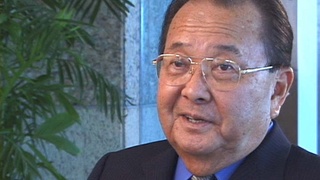Entrevistas
Feelings upon listening to the imperial rescript (Japanese)
(Japanese) We were all told to gather for an announcement by the Emperor on August 15th at 12 noon, so we gathered at the schoolyard, and sure enough we started to hear from the loudspeaker. Well the words [the sound] cut in and out, but we just believed that it was going to be a message of encouragement from the Emperor—something like, “We are entering the decisive phase of the war, so rally together and fight till the end!” But it [the announcement] was cutting out so badly that we all began to wonder, “What was really being said?” At that time, though, we were all thinking that the war has to be continuing on. But of course, in the afternoon, we get the real news that the war was already over—that we had actually lost. When I heard that, I was quite surprised. All I could say was “Oh, war is over…” So from August 15th to early September, I stuck around with my troop. We were mostly just bumming around, passing the days. Little by little, we came to realize that we’re going to be able to go home alive. Well, I said to myself that that’s a good thing, and so I went home to my hometown in Nagaoka.
Fecha: June 17, 2008
Zona: California, US
Entrevista: Yoko Nishimura
País: Watase Media Arts Center, Japanese American National Museum









